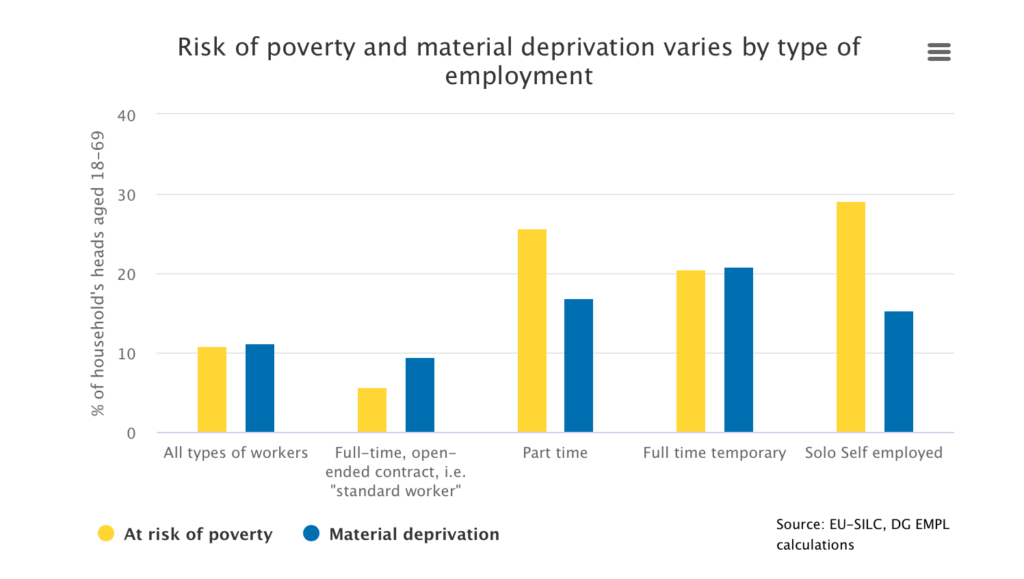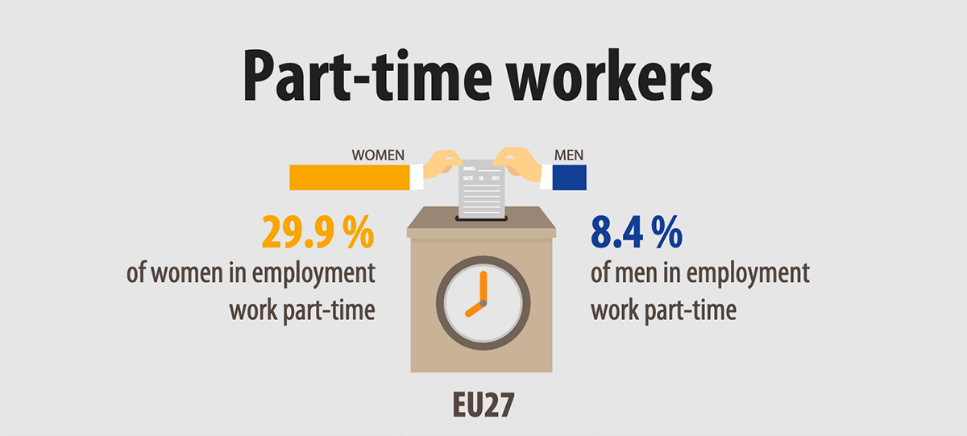Part-time work
Do you know that part-time work reduces not only your actual income but also your future opportunities in life?
Women are more likely to be employed in non-standard, temporary and part-time employment. These types of work provide you more flexibility to combine family and working duties but besides a lower pay it also reduces your income, your pay to the pension system and they diminish your access to training opportunities, social protection and other services.
The problem gets even more severe when part-time work is combined with low income. Whilst women in higher positions might be able to manage their life with a contract with less hours and might have return options to full time work, less qualified workers are affected by less chances of finding and keeping a job, returning to full time work at a later stage and perspectives to further develop their qualifications, in many cases even depending on the family income of their partner.
The rapidly changing requirements in workplace absences or limited access to training might exclude you from professional careers which men can pursue more easily.
In some EU-countries income even differs a lot in between sectors, being considered mainly female and male. Given that the changes in the labour market are largely technology-driven, the digital gender gap may create further cause for concern in the future as women are not sufficiently engaged in STEM (Science, Technology, Engineering and Mathematics).
Women are more likely to be employed in non-standard, temporary and part-time employment. These types of work provide you more flexibility to combine family and working duties but besides a lower pay it also reduces your income, your pay to the pension system and they diminish your access to training opportunities, social protection and other services.
The problem gets even more severe when part-time work is combined with low income. Whilst women in higher positions might be able to manage their life with a contract with less hours and might have return options to full time work, less qualified workers are affected by less chances of finding and keeping a job, returning to full time work at a later stage and perspectives to further develop their qualifications, in many cases even depending on the family income of their partner.
The rapidly changing requirements in workplace absences or limited access to training might exclude you from professional careers which men can pursue more easily.
In some EU-countries income even differs a lot in between sectors, being considered mainly female and male. Given that the changes in the labour market are largely technology-driven, the digital gender gap may create further cause for concern in the future as women are not sufficiently engaged in STEM (Science, Technology, Engineering and Mathematics).
THEREFORE…Reflecting these facts in your decisions might reduce your risk of poverty and dependence.


Figure: Eurostat Life of men and women in Europe, a statistical portrait. 2020
Country statistics/comparison:
Part time workers, age class: 15 to 64 years old.
EU (27) part time workers: 8.4% men and 29.8% women, 18.2% in total.
Iceland part time workers: 12,2% men and 34.9% women, 22.8% in total.
Bulgaria part time workers: 1.6% men and 2.1% women, 1.8% in total.
Greece part time workers: 5.5% men and 12.7% women, 8.6% in total.
Poland part time workers: 3.5% men and 8.9% women, 5.9% in total.
Spain part time workers: 6.5% men and 22.6% women, 13.9% in total.
Cyprus part time workers: 6,8% men and 13.6% women, 10% in total.
Sources:
European Commission (2018): Employment and social analysis – Employment and Social Developments in Europe 2018: Online Executive Summary. Last retrieved: 02.07.2021.
https://ec.europa.eu/social/main.jsp?catId=113&intPageId=5099&langId=en
Econstor (2016): Hanging in, but only just: Part-time employment and in-work poverty throughout the crisis. Last retrieved: 02.07.2021.
https://www.econstor.eu/bitstream/10419/195001/1/890254958.pdf
Eurostat. (2021). Part-time employment as percentage of the total employment, by sex, age and citizenship (%). Last retrieved: 02.07.2021. https://ec.europa.eu/eurostat/databrowser/view/lfsa_eppgan$DV_579/default/table?lang=en


The European Commission support for the production of this publication does not constitute an endorsement of the contents which reflects the views only of the authors, and the Commission cannot be held responsible for any use which may be made of the information contained therein.


Figure: Eurostat Life of men and women in Europe, a statistical portrait. 2020
Country statistics/comparison:
Part time workers, age class: 15 to 64 years old.
EU (27) part time workers: 8.4% men and 29.8% women, 18.2% in total.
Iceland part time workers: 12,2% men and 34.9% women, 22.8% in total.
Bulgaria part time workers: 1.6% men and 2.1% women, 1.8% in total.
Greece part time workers: 5.5% men and 12.7% women, 8.6% in total.
Poland part time workers: 3.5% men and 8.9% women, 5.9% in total.
Spain part time workers: 6.5% men and 22.6% women, 13.9% in total.
Cyprus part time workers: 6,8% men and 13.6% women, 10% in total.
Sources:
European Commission (2018): Employment and social analysis – Employment and Social Developments in Europe 2018: Online Executive Summary. Last retrieved: 02.07.2021.
https://ec.europa.eu/social/main.jsp?catId=113&intPageId=5099&langId=en
Econstor (2016): Hanging in, but only just: Part-time employment and in-work poverty throughout the crisis. Last retrieved: 02.07.2021.
https://www.econstor.eu/bitstream/10419/195001/1/890254958.pdf
Eurostat. (2021). Part-time employment as percentage of the total employment, by sex, age and citizenship (%). Last retrieved: 02.07.2021. https://ec.europa.eu/eurostat/databrowser/view/lfsa_eppgan$DV_579/default/table?lang=en


The European Commission support for the production of this publication does not constitute an endorsement of the contents which reflects the views only of the authors, and the Commission cannot be held responsible for any use which may be made of the information contained therein.

